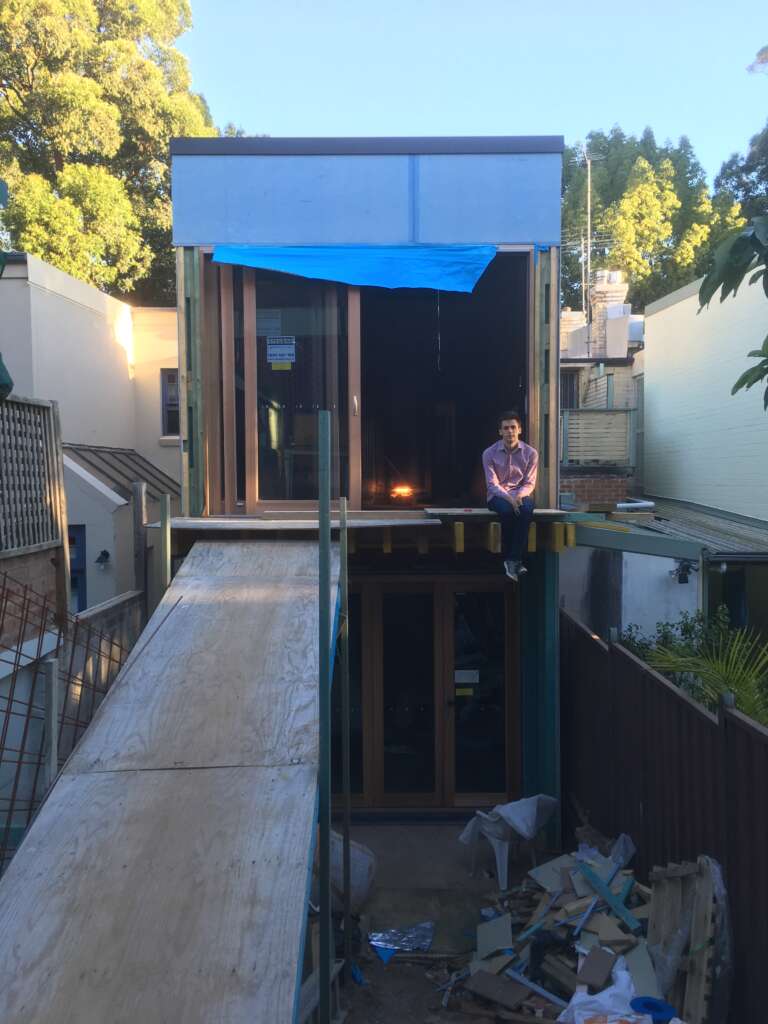My wife and I became one of those renovating couples.
We have the privilege of owning a three-and-a-half-metre-wide, 100-year-old terrace. When we first purchased the house it came with the added “feature” of an outside toilet, which was downstairs and a long, cold walk down an exposed corridor. The joy of this particular throne was enhanced by the dutiful leeches who guarded it, especially first thing in the morning. Let’s just say we became precise about when and how much liquid to drink each evening.
While I grew up in one never-changing family home, Kass grew up with her house always changing around her. Every house she moved into her family had a plan to make better over time. When we got married, Kass was full of stories of growing up in and around the construction of each home they lived in. I was a little unprepared for the experience that would follow.
It is my automatic response to dislike everything that brings discomfort my way.
The hot water was turned off, the kitchen was removed, the leech habitat was dismantled and we plumbed a new toilet through the floorboards in our dining room and covered it with a camping tent. We thought this was just good problem-solving. As it turned out, many workers on the site had never seen anything like it before.
We learned the art of cooking every meal in a slow cooker or on a sandwich press. Of course, as we went along, things just got more complicated. There was the time we found out that the next-door house had concreted in our stormwater drain, or when our staircase was pulling down the ceiling, or when we found termite damage in our old joists. At one extreme point, we were living in our bedroom, surrounded by all our furniture, with a corridor in which we did all the rest of life.
It was a stressful time. As someone accustomed to comfort, I found many things to complain about along the way. It is my automatic response to dislike everything that brings discomfort my way.

Matt’s narrow home, mid-renovation
I remember one particular day when I was praying. (I was still working from home in one room for a portion of our renovation – seriously what was wrong with me?) I was meditating on James 4:6, and how God opposes the proud but gives grace to the humble. On the other side of the wall, our builder began to jackhammer just as I started to pray. Straight away, I was grumbling to God about how difficult this made it.
But then something interesting happened: through the Bible verse and God’s Spirit, it suddenly occurred to me to imagine what it’s like dealing with my pride. I began to look from God’s perspective onto my own proud and sinful heart and realised that he was probably having to jackhammer – and much more – to remove my pride and bring me to humility.
From that day on, the renovation project changed for me. It no longer felt so much like an interruption as like one continuous metaphor. It was like I was living in a scale model of my own soul.
When perfectly good floorboards needed to be lifted up because of an unknown problem underneath, I considered and prayed with the psalmist, “search and know me”, “see if there is any offensive way in me” (Psalm 139:23-24) and “protect me from hidden faults” (Psalm 19:12).
When we realised that we had no stormwater drainage and had to dig up what was there, I wondered what deeper issues inside me God was dealing with.
When I needed to dig up the dirt in the backyard for hour upon hour on my days off, I meditated on the need for the soil of my heart to be broken up so that God might have his way.
It was like I was living in a scale model of my own soul.
This became a time of waking me up to the fact that I am a renovation site. I am a work in progress. There is someone at work in me, moving things toward his own design without me even realising. He had spotted problems he wanted to fix before I even realised they were there. God has plans and purposes and a vision for their completion in me.
All houses are different, and the process of their transformation is likewise. However, there is always a plan and a general way in which things do come about. It is the same in the work of transformation: there will always be a great divergence between plan and reality, but that does not mean there is no general pattern. How the living God transforms his people, in a lot of ways, is a mysterious and messy work, hard to quantify for every person. But I think Paul, in 2 Corinthians, pulls the strands together into one coherent picture:
“Now the Lord is the Spirit, and where the Spirit of the Lord is, there is freedom. And we all, who with unveiled faces contemplate the Lord’s glory, are being transformed into his image with ever-increasing glory, which comes from the Lord, who is the Spirit.” (2 Corinthians 3:17-18 NIV)
This profound work is often underneath the mess of our experience.
Here is the reality for all believers: life is changed not by good deeds or grand thoughts but by having a bigger vision of Jesus. The more we see of Jesus, the more we become like him. The Holy Spirit is doing two crucial things at the same time to renovate us:
- Giving us a vision of Jesus in our hearts
- Leading us into situations where we can be the image of Jesus.
Here is the whole Christian life: the Holy Spirit helping us apprehend the love of Christ and then enabling us to risk everything to resemble it in the real circumstances of life. In every room of our lives, he will be giving us opportunities to act like Jesus and will empower us to do it by looking closer and closer at Jesus. This is a profound work, which is often underneath the mess of our experience.
Of course, understanding all of this takes time, practice and reflection. Understanding this does not necessarily mean all things will add up, make sense or come together. Yet, we have the confidence of knowing, despite appearances, that something remarkable is happening. As Paul says elsewhere:
“For those God foreknew he also predestined to be conformed to the image of his Son, that he might be the firstborn among many brothers and sisters.” (Romans 8:29 NIV)
God is making brothers and sisters for Jesus. He is forming a people for himself. We need not be able to discern it always, but we can wake up every day and say, “If my life is a house, the Lord is at work, and what he has begun he will one day complete.”

Matt Aroney
Matt Aroney is the author of Renovated: How God makes us Christlike (2024) and a pastor at South Head Anglican. He, his wife, and three children live in Watsons Bay, Sydney. Matt is completing his PhD in Søren Kierkegaard’s theology at the University of Aberdeen. His family has renovated one house, but is unsure they could do another.


